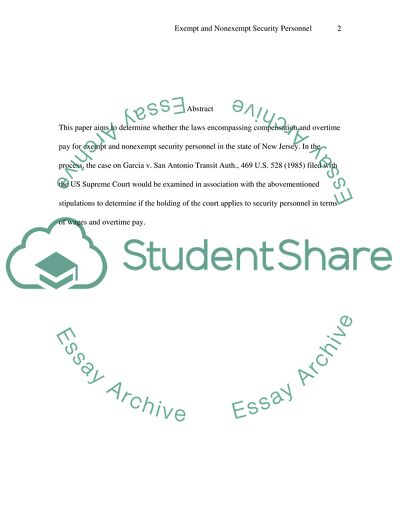
- Home
- Free Samples
- Premium Essays
- Editing Services
- Extra Tools
- Essay Writing Help
- About Us
- Studentshare
- Subjects
- Miscellaneous
- Human Resources Paper
Human Resources Paper - Essay Example

- Subject: Miscellaneous
- Type: Essay
- Level: Undergraduate
- Pages: 4 (1000 words)
- Downloads: 0
- Author: nils05
Extract of sample "Human Resources Paper"
Sometimes, state and federal laws conflict with regard to compensation and overtime pay. It is in the most advantageous capacity for employers to understand both federal and state laws and to act depending on which law is most beneficial to the employee. This paper aims to determine whether the laws encompassing compensation and overtime pay for exempt and nonexempt security personnel in the state of New Jersey. In the process, the case on Garcia v. San Antonio Transit Auth., 469 U.S. 528 (1985) filed with the US Supreme Court would be examined in association with the abovementioned stipulations to determine if the holding of the court applies to security personnel in terms of wages and overtime pay.
“The Fair Labor Standards Act (FLSA) requires employers to pay employees overtime (1 1 2 times their regular rate of pay) if they work over 40 hours ( 29 CFR 541 et seq. ). The FLSA also contains exemptions. Employers may not have to pay overtime to administrative, executive, professional, computer, outside sales personnel, and certain highly compensated employees. In order to qualify as exempt from the overtime pay requirements, an employee must pass three tests: the salary level test, salary basis test, and duties tests.
” (Business & Legal Reports, Inc. 2009) “New Jersey law requires employers to pay employees overtime (1 1 2 times their regular rate of pay) if they work over 40 hours in a week. Under New Jerseys state Wage and Hour Law, individuals employed in a bona fide executive, administrative, professional, or outside sales capacity may be exempt from the overtime provisions of the law ( NJ Rev. Stat. Sec. 34:11-56a)” (ibid.) According to an article entitled “Exempt Employees Aggravated by Long Hours” (2002), “there are four white-collar exemptions to the minimum-wage and overtime requirements of the FLSA: executives (managers), administrators, professionals, and outside sales representatives.
The exemptions
...Download file to see next pages Read MoreCHECK THESE SAMPLES OF Human Resources Paper
The Human Resource Frame Paper
Paper Number 3 - Human Resource Management
Human Resources - Compare and Contrast Interview Paper
Human Resource Paper
Research Paper on Human Resource Diversity
HUMAN RESOURCE PAPER
Legal Regulation Impacting Human Resources Paper: Drug-Free Workplace Act
White Paper: Human Resource Management

- TERMS & CONDITIONS
- PRIVACY POLICY
- COOKIES POLICY